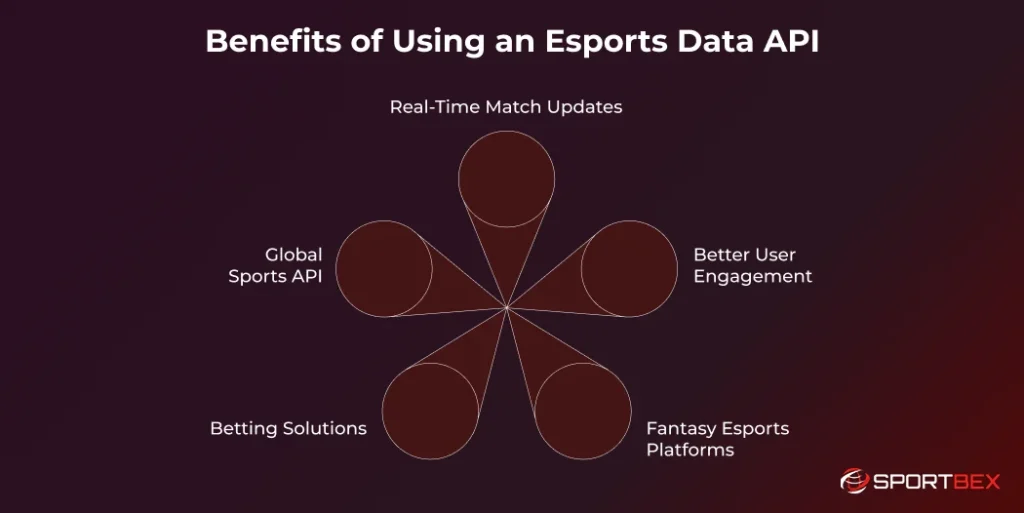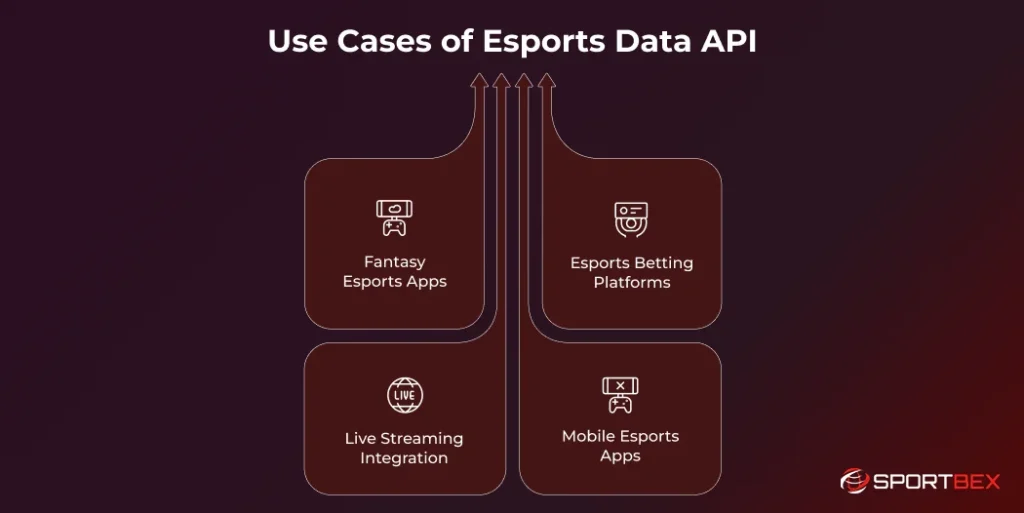The esports industry is growing fast and is now worth billions of dollars. With global revenues expected to rise significantly and a massive audience worldwide, many businesses are working to create tools and platforms to benefit from this growth. Whether you’re building a fantasy esports app, a streaming service, or another innovative solution, one key to success is having reliable, real-time esports data.
API solutions are essential for building great esports platforms. They help developers provide the exciting, data-rich experiences users want. With live match stats, player performance data, tournament brackets, and team standings, the right Esports API can transform a simple app into a complete esports hub that keeps users engaged and coming back for more.
Many developers don’t struggle to find esports data, but to get the right data in the right format at the right time. This is why understanding how to integrate an Esports Data API into your platform is crucial for building reliable, scalable, and user-friendly esports solutions.
This comprehensive guide will walk you through everything you need to know about selecting, integrating, and optimizing an Esports Game Data API for your platform, ensuring you build something that stands out in an increasingly competitive marketplace.
What Is an Esports Data API?
An Esports Data API serves as a bridge between your application and comprehensive esports databases, delivering structured information about competitive gaming events, players, teams, and match results through standardized endpoints.
Unlike traditional sports APIs that focus on established leagues with predictable schedules, Esport API must handle the unique complexity of the gaming ecosystem, including multiple game titles, varying tournament formats, frequent roster changes, and matches that can occur around the clock across different time zones.
These APIs collect data from many sources, including game publishers, tournament organizers, streaming platforms, and community-driven databases, often working closely with an Esports content provider to ensure accuracy and coverage. The information flows through advanced data processing systems that clean, standardize, and format the content before making it available to developers through RESTful endpoints or WebSocket connections for Real-Time Esports Data delivery.
Benefits of Using an Esports Data API

Real-Time Match Updates
Live Esports Feed API capabilities represent one of the most significant advantages of modern esports data integration. Unlike traditional sports, where plays unfold over minutes, esports matches can change dramatically in seconds. A single teamfight in League of Legends or a clutch round in Counter-Strike can completely shift match momentum, making real-time updates and a reliable Sports Data API essential for maintaining user engagement.
The technical implementation of real-time updates typically leverages WebSocket connections or Server-Sent Events (SSE) to push data to your platform as events occur. This approach eliminates the need for constant polling, reducing server load while ensuring users receive information with minimal latency.
Better User Engagement
Comprehensive esports data enables the creation of engagement features that keep users active on your platform long after matches conclude. Statistical analysis tools allow users to dive deep into player performance trends, team composition effectiveness, and historical matchup data.
These features appeal to the analytical nature of many esports fans who enjoy understanding the strategic depth behind competitive gaming. Interactive elements like live prediction markets, achievement systems, and social features benefit enormously from rich data integration.
Fantasy Esports Platforms
The fantasy esports market represents one of the fastest-growing segments within the broader esports ecosystem, and robust data integration is absolutely critical for platform success. Fantasy Sports API for esports needs advanced data handling compared to traditional sports. This is because esports have complex scoring systems and many different stats that vary across game titles.
Creating compelling fantasy experiences requires access to granular player statistics that go beyond simple win/loss records. For MOBA games like League of Legends or Dota 2, relevant statistics include kills, deaths, assists, gold earned, damage dealt, wards placed, and objective participation.
Betting Solutions
Esports betting presents unique opportunities and challenges compared to traditional sports betting platforms. With the rise of API esports solutions, the round-based nature of many esports titles enables micro-betting opportunities where users can place wagers on individual rounds, objectives, or even specific in-game events.
This granular betting requires extremely reliable real-time data feeds and sophisticated odds calculation systems. Pre-match betting benefits from comprehensive historical data that allows for informed odds setting and market creation.
Use Cases of Esports Data API

Fantasy Esports Apps
Fantasy esports applications represent one of the most data-intensive use cases for Esports Game Data API integration. These platforms must process vast amounts of statistical information while providing users with intuitive interfaces for team selection, scoring tracking, and competitive league management.
The complexity stems from the need to standardize diverse statistical categories across multiple game titles while ensuring fair and engaging scoring systems. Successful fantasy esports apps leverage historical performance data and Real-Time Sports Data to give users powerful tools for making informed decisions.
Player consistency metrics, performance against specific opponents, and situational statistics help users evaluate potential roster additions and build stronger lineups.
Get Live Odds for Top Esports Titles
Use our reliable and fast API to create an engaging fan experience.
Esports Betting Platforms
Esports betting platforms need advanced data systems that do more than just show match results. With the right esports data feed and an esports match api, they can offer many types of betting options that match the fast and exciting world of competitive gaming.
Unlike traditional sports, where betting options are relatively standardized, esports offers opportunities for highly specific wagers based on game mechanics and strategic elements. Pre-match betting markets benefit from comprehensive statistical analysis capabilities.
Platforms using an esport odds API can offer odds on total match duration, specific map outcomes in tactical shooters, or which team will secure the first major objective in strategy games.
Live Streaming Integration
Platforms enhanced with comprehensive esports data create immersive viewing experiences that rival official game broadcasts. By integrating Live Sports Stream features with data overlays, viewers gain real-time statistics, player information, and match context that enhance both understanding and engagement.
These integrations transform passive viewing into interactive experiences where users can access detailed information about players, strategies, and game mechanics. Second-screen experiences represent a growing trend where viewers use mobile apps or web platforms alongside main viewing streams.
These companion applications can display detailed statistics, social features, esports betting API integration, betting opportunities, or fantasy scoring updates without cluttering the primary viewing experience.
Mobile Esports Apps
Mobile applications focused on esports content face unique challenges related to data efficiency and user interface design. Limited screen real estate requires careful prioritization of information display, while data usage concerns necessitate intelligent caching and update strategies.
Users can receive alerts about match starts, significant in-game events, or final results for their followed teams and players. The key to effective notification strategies lies in personalization algorithms that learn individual user preferences and deliver relevant alerts without overwhelming users with excessive communication.
The most successful mobile esports apps leverage Esports Data API integration to provide comprehensive functionality within these constraints.
Step-by-Step Guide to Integrating Esports Data API
This guide will help you connect the API smoothly, ensuring accurate data, real-time updates, and a better user experience.
Step 1: Choose the Right API Provider
Selecting an appropriate esports data provider requires careful evaluation of multiple factors that will impact your platform’s long-term success. Start by assessing the scope of data coverage, ensuring the provider offers comprehensive information for the game titles and tournaments most relevant to your target audience.
Step 2: Obtain API Credentials
Once you’ve selected a provider, the registration process typically involves creating a developer account and specifying your intended use case. Most providers offer multiple access tiers, from free esports api trials with limited functionality to enterprise-level accounts with full feature access.
Step 3: Set Up Your Development Environment
Establish a robust development environment that supports the technical requirements of esports data integration. This typically involves setting up database systems capable of handling high-frequency updates, implementing caching layers to reduce API request volumes, and creating monitoring systems to track data quality and system performance.
Step 4: Implement API Integration
Begin with basic endpoint integration, focusing on core functionality like match results, team information, and player statistics. Write robust error handling code that gracefully manages API timeouts, rate limiting, and temporary service interruptions. Esports platforms often experience traffic spikes during major tournaments, so your integration must remain stable under varying load conditions.
Step 5: Test and Deploy
Conduct thorough testing across all integration points, simulating various scenarios including high-load conditions, network interruptions, and edge cases specific to esports data. Test your system’s behavior during live matches when data update frequencies are highest and user traffic peaks.
Conclusion
The esports industry’s rapid growth presents unprecedented opportunities for developers and businesses willing to invest in sophisticated data integration strategies. Success in this space requires more than simply accessing esports information; it demands thoughtful implementation that prioritizes user experience, data reliability, and platform scalability.
The platforms that will dominate the esports ecosystem are those that leverage Esports Data API solutions to create genuinely valuable experiences rather than simply displaying raw statistics. Your strategy, whether focused on data integration or a Sports Betting API, should reflect a deep understanding of your target audience and their specific needs.
Fantasy sports enthusiasts require different data presentations than casual viewers, while betting platforms need ultra-reliable real-time updates that statistical analysis tools might not require. The most successful implementations carefully balance comprehensive data access with user-friendly interfaces that don’t overwhelm users with unnecessary complexity.
Your All-in-One Esports Data Feed
Deliver real-time scores, stats, and in-game events for top esports titles.
Frequently Asked Questions
An Esports Data API provides real-time data on esports games, including match schedules, live scores, player stats, and team rankings. It helps developers integrate accurate esports data into apps, betting platforms, and fantasy sports solutions.
By delivering instant updates, live scores, and interactive stats, an Esports Data API keeps users engaged with real-time information, enhancing their experience and retention rates.
Yes! Esports Data APIs are perfect for fantasy platforms. They provide detailed stats like player performance and match history, enabling accurate scoring and live draft experiences.
Real-time data ensures accurate odds, live score tracking, and fast bet settlements, which are crucial for building trust and maintaining a seamless betting experience.
Look for coverage across multiple esports titles, low latency, easy integration, detailed documentation, and scalable pricing plans to fit your platform’s needs.
Recent Blog
Which Real-Time Sports Data API Offers the Fastest Live Updates?
January 23, 2026
 9 min
9 min
How Does a Live Odds Provider Deliver Real-Time Betting Data
January 23, 2026
 7 min
7 min







